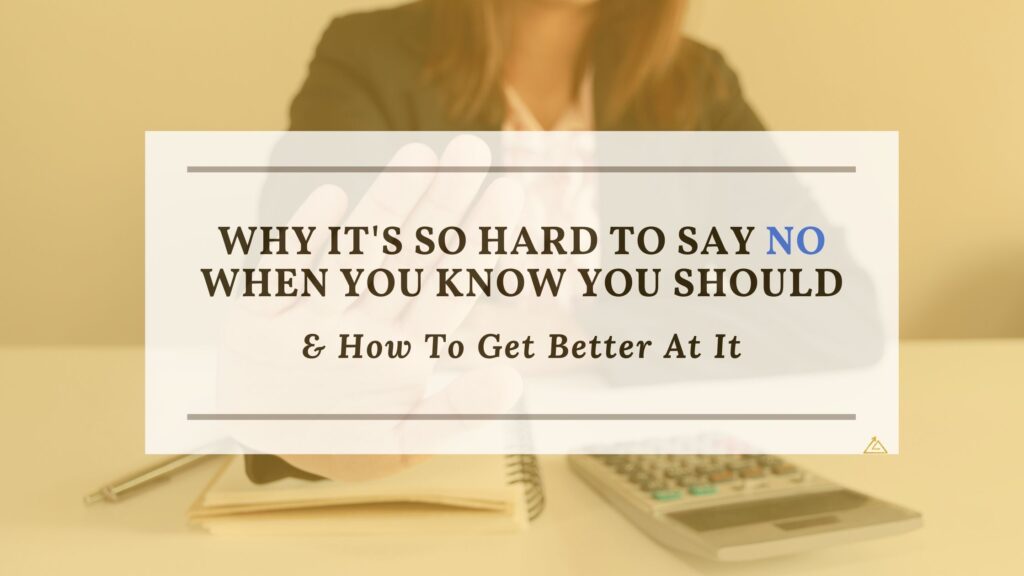Have you ever said YES, though you KNEW you shouldn’t?
I certainly found myself in these situations more often than I’d like to admit… I hardly ever said no to new projects, helping others, and simply doing more, though my capacity was already maxed out. Because it’s good to show initiative, and be a team player, isn’t it?
And in my private life? Who wouldn’t help their friends and family? Of course, I’d feel selfish and guilty if I said no just because I was planning to take some rest or do what I wanted.
As if that was not enough, after I became a mom I felt I lost the right to say no because a great mom is supposed to give her all, unconditionally, right? I thought that was part of the deal.
But then resentment started to grow inside. I resented my situation, everyone, and everything that kept asking my attention, energy, and time because I felt I had nothing more to give. I was exhausted.
And it made me wonder, why is it so hard to say NO when you know you should?
The Answer
I found the answer ‘by coincidence’ (as all of the great aha moments usually happen) with Dr. Gabor Maté, a renowned expert on stress, addictions, trauma, and childhood development. His explanation was the first one that made sense.
It’s all about our two core survival needs:
- Attachment – our drive to be close to another person to be taken care of. It’s a must for all mammalian babies who couldn’t survive on their own for more than a few hours.
- Authenticity – being in touch with ourselves, our gut feeling. Because for most of human history, we lived in nature. And you wouldn’t last long if you didn’t listen to your gut feeling and survival instinct.
Now back to saying NO…
Remember the last time you felt you should refuse something?
You wanted to say no (authenticity) but you were not comfortable because it would have an impact on your relationship with others (attachment).
Consequences
And as each choice we make, this one also has an impact.
Each NO is followed by guilt, fear of rejection, not belonging, and not being liked/loved.
And each YES that clashes with your authenticity results in resentment, stress, and pressure.
An impossible choice, right?
That’s why many of us rather go for resentment and suppress our own needs, rather than put at risk our relationship with others.
And that’s what makes it so hard to find your way out of this. But there is a way out.
Would you like to learn about it?
As I started explaining above, Dr. Gabor Mate says it’s all about two core survival needs that every child has:
- ATTACHMENT – our drive to be close to another person to be taken care of. It’s a must for all mammalian babies who couldn’t survive on their own for more than a few hours.
- AUTHENTICITY – being in touch with ourselves, our gut feeling. Because for most of human history, we lived in nature. And you wouldn’t last long if you didn’t listen to your gut feeling and survival instinct.
Unfortunately, in your childhood you learned that to be acceptable and lovable, you often had to suppress being yourself. Because your parents disapproved of or even punished you for expressing feelings that triggered them. (One of my clients was too happy when the family was grieving a loss. Another was beaten by her police dad who couldn’t stand it when she cried. And most of our parents couldn’t handle it when we got angry or upset about anything.)
So the difficulty of saying NO comes from the survival need to choose attachment over authenticity. And because that need doesn’t have any expiration date, we keep acting it out for the rest of our lives, on autopilot.
CONSEQUENCES
When you say yes though you know you shouldn’t, you feel resentment. Because you feel forced to do something you don’t want to do. You feel resentful towards that person or situation for needing more than you’re willing to give.
If you say no, you feel guilt, to keep yourself in line and attached to that relationship.
HOW TO GET BETTER AT SAYING NO
Based on Dr. Gabor Mate’s work:
- Where in my life do I have difficulty saying NO?
- What story do I tell myself about why I didn’t say NO?
- Is that story true? (Would you accuse anyone of being selfish if they said NO to you in this situation? If not, why do you have a double-standard for yourself?)
- What is the impact on you when you don’t say NO?
Realize it’s a survival strategy from childhood, and you’re an adult who has a choice.
And whenever you feel split between guilt and resentment, guilt is always better from your health perspective, because by saying NO to others, you’re saying YES to yourself.
As staying attached without authenticity and not saying NO has serious consequences – resentment, disease, stress, and burnout, …
Whatever you decide, just be aware of your choice and its consequences. Don’t do it automatically anymore.
Comment or let me know: What was your aha moment about saying NO?
And how are you going to benefit from this awareness going forward?
Take care,


